|
|
|
Sort Order |
|
|
|
Items / Page
|
|
|
|
|
|
|
| Srl | Item |
| 1 |
ID:
100070
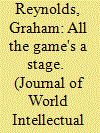

|
|
|
|
|
| Publication |
2010.
|
| Summary/Abstract |
The primary purpose of this article is to examine the extent to which Canada's copyright laws permit the creation of machinima, an art form broadly defined as the creation of films within video games. This article is structured as follows. First, it will introduce machinima, discussing its origins, its development and its social importance. Second, it will examine whether the acts of creating and distributing machinima infringe copyright in Canada. Third, it will ask whether there are any defences to copyright infringement on which machinimators (those who create machinima) can rely. This article will demonstrate that, in many cases, the creation and distribution of machinima likely infringes Canadian copyright law. Furthermore, a large percentage of machinima that are found to infringe copyright will not be protected by the fair dealing defence as it is currently being applied by Canadian courts. This article will conclude by situating the narrow issue of machinima and copyright infringement within the broader context of creativity and copyright reform in the digital age.
|
|
|
|
|
|
|
|
|
|
|
|
|
|
|
|
| 2 |
ID:
095578


|
|
|
|
|
| Publication |
2010.
|
| Summary/Abstract |
This article shows that despite a vast harmonization programme in the field of copyright and registered design right, the degree of protection of designers in the European Union still differs greatly. This is owed to the lack of harmonization in copyright and unfair competition laws. The article shows that not only is there a difference in the scope of protection between the common law and civil law countries but also between civil law countries. The countries chosen for the comparison are the United Kingdom, France and Italy. The article concentrates on the case law of the last 5 years and concludes that there is a need for further harmonization in the fields of copyright law and unfair competition law, as well as guidance from the European Court of Justice on the test of infringement for registered designs as it has been interpreted very differently in at least two member states.
|
|
|
|
|
|
|
|
|
|
|
|
|
|
|
|
| 3 |
ID:
190947
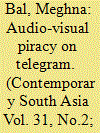

|
|
|
|
|
| Summary/Abstract |
Telegram, an encrypted digital messaging application, is an emerging hotbed for digital piracy. It has several features that make it attractive for pirates, including the ability to share large files at scale, coupled with an emphasis on privacy and security that allows for such sharing to be carried out largely anonymously. Telegram gained prominence in academic literature as a safe haven for activities in the digital realm that have increasingly found themselves subject to institutional censure. However, while most studies have delved into the matter of online video piracy on Telegram, perspectives on the economic models and revenues relied on by Telegram pirates in India remain largely unexplored. This paper proposes to discuss Telegram’s ascent as a significant medium in the Audio-Visual piracy market in India and will more specifically analyse the mechanisms of piracy monetization (payment services, and ad-revenue generators) which represent an important stake in pirates’ strategies. Finally, the paper argues that the analysis in terms of economic models represents a valuable contribution to current debates on copyright enforcement. The methodology relies on both primary and secondary sources complemented with semi-structured interviews with pirates and an entertainment industry professional.
|
|
|
|
|
|
|
|
|
|
|
|
|
|
|
|
| 4 |
ID:
140722
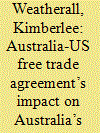

|
|
|
|
|
| Summary/Abstract |
The Australia-US Free Trade Agreement (AUSFTA) required extensive changes to Australian copyright law. This paper assesses the impact of these changes one decade on. It considers, first, whether the costs and/or benefits predicted in 2004 have eventuated, finding clear evidence that AUSFTA has undesirably constrained domestic copyright policy, but no clear evidence either of the feared financial costs to society, or, importantly, the touted benefits to copyright owners. The most significant impact of AUSFTA’s copyright provisions, however, appears to have been on Australia’s copyright trade policy. Pre-AUSFTA, Australia promoted multilateral standards and mostly sought to comply with, but not exceed, international IP standards. Post-AUSFTA, Australia has pursued an approach akin to that of the US: endorsing international copyright rules that are significantly stronger, and more detailed. The paper queries whether this shift has been in Australia’s national interest, and raises interesting questions of path-dependence in policymaking and trade negotiations that warrant more, and broader attention in the literature.
|
|
|
|
|
|
|
|
|
|
|
|
|
|
|
|
| 5 |
ID:
153536
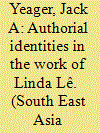

|
|
|
|
|
| Summary/Abstract |
Issues of authenticity, originality, and plagiarism have haunted Francophone literatures from the time Camara Laye was first accused of having copied the work of others. Official positions on plagiarism and copyright have provided a framework to judge the originality of literary and scholarly work, but even these pronouncements leave much open to interpretation, which may, in fact, mask the real motivations for accusations of plagiarism. Francophone writers with links to Vietnam would also be under scrutiny in such a context. Linda Lê, the most prolific writer “from Vietnam” who writes in French, cleverly and playfully treats the questions of literary authenticity, creativity, originality, intertextuality, and authorship in a strong metatextual thread running in some form throughout her long bibliography. In this way, she also examines the position of the immigrant writer in exile, the negotiation of multiple heritages and languages, and what is necessarily the shifting literary scene in France and elsewhere, as immigrant writers, among others, redefine “French literature.”
|
|
|
|
|
|
|
|
|
|
|
|
|
|
|
|
| 6 |
ID:
101072
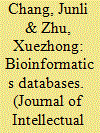

|
|
|
|
|
| Publication |
2010.
|
| Summary/Abstract |
Intellectual property (IP) protection for bioinformatics databases plays a key role in accelerating development of biological sciences and biotechnological industry. This paper presents current and global position of IP protection in bioinformatics database. A protection method has been proposed after analysing characteristics of bioinformatics databases and considering different database protection methods. Further, the paper seeks to analyse the diffusion process of biological information and develops an argument that bioinformatics primary database should be put in public domain, though they may be given financial subsidies by the government or other public funds according to the diffusion phase of biological information. Suitable methods of IP protection in the bioinformatics secondary database have been suggested.
|
|
|
|
|
|
|
|
|
|
|
|
|
|
|
|
| 7 |
ID:
110290
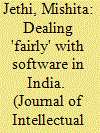

|
|
|
|
|
| Publication |
2011.
|
| Summary/Abstract |
Section 52(1)(ab) of the Copyright Act, 1957 deals with the fair use exception in case of computer software. This paper attempts to analyse the scope of this exception when applied to software as a work of art in India. The right to decompile, as found in different countries and enactments, is compared with the Indian position. It is argued that this right must be given very strictly. The Indian position on the right to decompile is very nebulous. The statutory guidelines are insufficient and poorly drafted, leaving the limits of this right uncertain. Allowing decompilation without placing distinct restrictions on how to use such extracted information, completely outweighs the reasoning of fair use doctrine. Inadequate guidelines as to the extent to which a program may be reverse engineered and who is allowed to reverse engineer, leaves loopholes in the protection of software copyright, allowing circumvention of copyright and the defence of fair use while commercially exploiting competing interoperable programs. The paper concludes by stating that with the growing rate of peer-to-peer sharing in India, this exception, unless narrowed down in its scope, may go beyond mere fair use and may be used to circumvent liability for infringement of copyrighted software.
|
|
|
|
|
|
|
|
|
|
|
|
|
|
|
|
| 8 |
ID:
110315
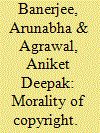

|
|
|
|
|
| Publication |
2011.
|
| Summary/Abstract |
This article seeks to examine debatable issues that have arisen following the controversy involving author's rights after the release of the film '3 Idiots' based on Chetan Bhagats's novel '5 Point Someone'. The fact that Bhagat failed to get due recognition in the credits of movie along with alleged mutilation of the original work raises the question of recognition of moral rights in India. Following the 1994 amendment, copyright law has drifted away from the objective of viewing a work as an integral expression of the author's personality - probably reason why contracts continue to dictate the rights and obligations of parties in such transactions. This article throws light on the need to restore focus on these legitimate concerns by undertaking a critical comparison of the position under foreign laws. The difference in the perspectives of common law and civil law countries in treating the issue of morality of copyright has been marked. A number of illustrative case laws and international conventions have been discussed under various jurisdictions to cull out the basic tenets of moral nature of copyright. The article also puts forth certain suggestions to address the legal concerns.
|
|
|
|
|
|
|
|
|
|
|
|
|
|
|
|
| 9 |
ID:
095583


|
|
|
|
|
| Publication |
2010.
|
| Summary/Abstract |
The mainstream discourse in Egypt, as elsewhere, deals with music as a private good, where markets are best optimized by the price mechanism and creators are motivated by profits realized through unit sales. Such discourse is reflected in copyright law. Maximal intellectual property protection is presumed to keep the incentive system intact by formulating and enforcing ever-tighter copyright controls, and imposing sanctions on free-riding "pirates". This research adopts a different approach based on the premise that music embodies some characteristics of a public good, where the market mechanism typically fails to maximize both production and access, and where tension arises between the interests of producers and consumers. Extensive empirical research reveals that this tension is eased through business models and actual practices of music production and delivery as they exist on the ground in the alternative music scene in Egypt. These models of de facto commons are found to be more closely aligned with the interests of musicians and fans, and do in essence promote access to knowledge contrary to what the formal domestic IP law and policy formulation preach (but not enforce). This brings to question the relevance of copyright to the alternative music scene in Egypt, as opposed to the influence of prevailing social and cultural norms and economic realities.
|
|
|
|
|
|
|
|
|
|
|
|
|
|
|
|
| 10 |
ID:
165867
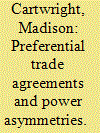

|
|
|
|
|
| Summary/Abstract |
Since the 1980s states have sought to harmonise economic standards to aid the flow of goods, services and finance across borders. The founding agreements of the World Trade Organisation (WTO), for example, harmonised standards on services, intellectual property and investment. However, mutlilateral trade negotiations in the WTO have since stalled. In response, the United States (US) has engaged in forum shopping, using preferential trade agreements at the bilateral, regional and multinational level to harmonise international standards. This article argues that through forum shopping the US has been able to export standards that support the commercial interests of US-based industries more than they encourage economic exchange across borders. Furthermore, because power asymmetries are starker in preferential trade negotiations smaller and middle power states should not enter trade agreements, which include regulatory harmonisation. This is illustrated with the case of the US-Australia free trade agreement, looking specifically at a copyright standard known as technological protection measures (TPMs). It was clear before, during and after the agreement was signed that Australia’s existing standard on TPMs was more popular than the US-style standard. Nevertheless, a US-style standard is in effect domestically because of the trade agreement.
|
|
|
|
|
|
|
|
|
|
|
|
|
|
|
|
| 11 |
ID:
001883
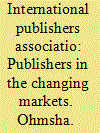

|
|
|
|
|
| Publication |
Ohmsha, Japan Book Publishers, 1998.
|
| Description |
xx,364p.
|
| Standard Number |
9051994222
|
|
|
|
|
|
|
|
|
|
|
|
Copies: C:1/I:0,R:0,Q:0
Circulation
| Accession# | Call# | Current Location | Status | Policy | Location |
| 042877 | 070.59/PUB 042877 | Main | On Shelf | General | |
|
|
|
|
| 12 |
ID:
110491
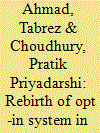

|
|
|
|
|
| Publication |
2011.
|
| Summary/Abstract |
The recent copyright controversy, the Google Books litigation, has revived interest in the role that opt-in requirements can play in copyright law. Google Books sought to make every book in the English language text-searchable. To realize this goal, however, Google intended to scan the text of each such book - thereby making a copy - the right to which was vested in different persons around the world. This number of persons amounted to millions and gaining access to all was an onerous task. So, when the company failed to get permission from all the copyright owners, it gave two options to the authors either to opt-out of the copyright or agree to it by as per the result of a class action litigation. In both these circumstances, the user of the copyright had the right to exploit, without authorization, unless the copyright holder took affirmative action. It is the essence of opt-in system in copyright which reared its head once more along with this controversy. This paper critically examines the protection regime in copyright law and the philosophy of protection given to any author over his/her original creation in the light of the above mentioned controversy bearing a potential impact over the fair use doctrine in copyright law. In the present context of highly digitalized society, the dilemma is whether an opt-out system is the need of the hour or the opt-in system should regain its place.
|
|
|
|
|
|
|
|
|
|
|
|
|
|
|
|
| 13 |
ID:
085866
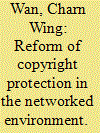

|
|
|
|
|
| Publication |
2008.
|
| Summary/Abstract |
On 15 April 2008, the Hong Kong government released its preliminary proposals on Copyright Protection in the Digital Environment, which cover the civil and criminal liabilities of online infringers and the role of online service providers (OSPs) in combating internet piracy. The preliminary proposals favor OSPs and users more than copyright owners. The government proposes that the OSPs, the content industries and users should voluntarily create a code of practice which defines the role and scope of OSPs in the fight against online piracy. The OSPs oppose any rules making them liable for copyright infringement and the safe harbor provisions. The content industries, in contrast, insist that, in line with international norms, both OSP liability and safe harbor provisions be written into the code of practice. I argue that, in the absence of any assignment of legal right to any party, the Coase theorem predicts that negotiations will fail. The key issue is which party should bear the transaction costs of copyright enforcement, because there are millions of online infringers; however, if the transaction costs of enforcing copyright in the networked environment are prohibitively high, the credibility of the copyright system will be undermined and online piracy will become commonplace.
|
|
|
|
|
|
|
|
|
|
|
|
|
|
|
|
| 14 |
ID:
086728
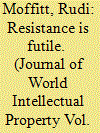

|
|
|
|
|
| Publication |
2009.
|
| Summary/Abstract |
The idea of resistance generally has normative associations, particularly in the current intellectual property (IP) environment. Justifications for actions are framed as supporting an aggrieved party in an unequal struggle against a clearly superior opposition. The adoption of the mantle of resistance is not limited to one side. Just as organizations such as Electronic Freedom Foundation claim they are part of the resistance to global corporate domination of culture, musicians, music owners and their associations portray themselves as mounting a resistance against a veritable tsunami of technology-driven piracy that threatens to destroy the production of culture and the livelihood of artists. This article starts from this point in order to question the assumptions we have about resistance. Using a paradigmatic framework, it will recast resistance as points in a historic process that are normatively neutral yet ontologically and practically potent. Application of this framework to the history of Anglo-American copyright reveals two types of resistance that bracket a major shift in the conceptualization and practice of the paradigm. In the end, this perspective demythologizes resistance. Resistance, in this perspective, is not emancipatory or heroic; it is another tool that can be useful in particular moments in the complex struggles over the defining of our social existence.
|
|
|
|
|
|
|
|
|
|
|
|
|
|
|
|
| 15 |
ID:
022866
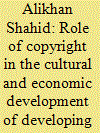

|
|
|
|
|
| Publication |
Nov 2002.
|
| Description |
489-508
|
|
|
|
|
|
|
|
|
|
|
|
|
|
|
|
| 16 |
ID:
110493
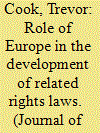

|
|
|
|
|
| Publication |
2011.
|
| Summary/Abstract |
As a European intellectual property lawyer, the author is often struck by the amount of comparative analysis in the area of intellectual property which adopts US intellectual property laws, rather than European ones, as their point of comparison. This seems strange when in many respects US intellectual property laws have their own unique features and when European such laws are often more closely aligned with the laws of most other countries in the world. This series of articles aims to expand knowledge of and to explain something of European intellectual property laws; how they got to their present state, what are current hot topics in them, where they are heading and why they matter. This second article in the series will focus on related rights.
|
|
|
|
|
|
|
|
|
|
|
|
|
|
|
|
| 17 |
ID:
089874
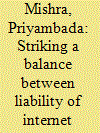

|
|
|
| 18 |
ID:
092458
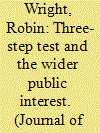

|
|
|
|
|
| Publication |
2009.
|
| Summary/Abstract |
Intellectual property law aims to protect the public interest in two often-contradictory ways: by granting exclusive rights to encourage creativity and by limiting those rights in certain situations for socially beneficial purposes. The Three-Step Test in international intellectual property treaties aims to ensure that limitations and exceptions to intellectual property rights do not inappropriately encroach upon the interests of rights holders. This article examines the interpretation of the Three-Step Test as included in the Agreement on Trade-Related Aspects of Intellectual Property Rights for copyright and patents by two World Trade Organization dispute-resolution panels and by other commentators. It looks at how these interpretations have dealt with the public policy motivations underlying limitations and exceptions to exclusive rights, and considers the ways in which the public policy intentions that underlie decisions by national legislators to adopt the limitations and exceptions to intellectual property rights can be considered in each step of the test. The conclusion reached is that the Three-Step Test contains the potential to allow both aspects of the public interest to be considered as part of an inclusive interpretation.
|
|
|
|
|
|
|
|
|
|
|
|
|
|
|
|
|
|
|
|
|